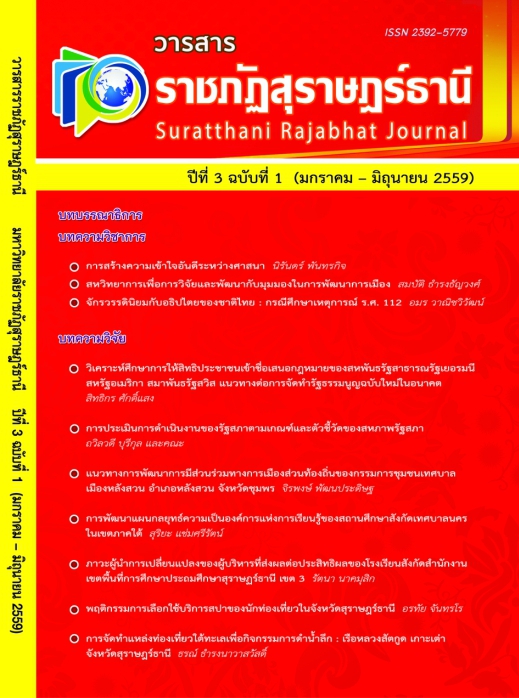Assessment of Thai Parliament Based on Inter - Parliamentary Union - IPU Index
Main Article Content
Abstract
The project, Assessing Thai Parliament by Inter-Parliamentary Union Criteria, was evaluation research that aimed at measuring the effectiveness and efficiency of Thai parliament. The study was conducted and based on the Inter-Parliamentary Union (IPU) framework to assess the work of parliaments in six areas, namely, 1) the representativeness of parliament, 2) parliamentary oversight over the executive, 3) parliament's legislative capacity, 4) transparency and accessibility of parliament, 5) the accountability of parliament, and 6) parliament's involvement in international policy. The study covers assessing 24th Thai parliament’s performance (2013), comparing performance between 23rd (2011) and 24th (2013) Thai parliament, and comparing performance between members of the house of representative and senators of Thai parliament (2013).
The process used for assessing Thai parliament was both qualitative and quantitative study which were divided into two parts according to the main target groups, encompassing the assessment of Thai parliament in terms of six areas according to the IPU pattern, and another assessment by means of questionnaires to gauge the opinions of the public towards parliament in terms of representativeness, relations, satisfaction, and trust. Data for assessing Thai parliament in six areas according to the IPU pattern was collected by focus group. Assessors were members of parliament, senators, parliamentary officials, high ranking officials, journalists, leaders of civil society, leaders of NGOs, experts, representatives from the private sector and local administration. For the analysis of the gathered data, descriptive statistics such as percentage, mean, ratio, and standard deviation were used.
For assessing general public opinion on the work of parliament, a questionnaire was used to draw the opinion from the general public regarding their trust towards parliament in terms of representativeness, relationships, satisfaction, and trust. The target groups of people were those who are eligible to vote (at least 18 years of age) chosen by sampling method. Analysis was undertaken using descriptive statistics package and measures such as frequency and percentage.
Assessing in 2013, according to the general attitudes towards the performance of the parliament at present, participants in the focus groups assessed performance as being at medium level and they gave the highest score to legislative capacity. The section that came second is oversight over executive, transparency and accessibility. Also, the sections that were lowest were representativeness and accountability.
In term of public opinion, 69.5 per cent of respondents believed that members of the House of Representatives and senators do represent all religions. Regarding social relationship, most of the people, accounting for 63 per cent, deemed that behaviors of members of the House of Representatives and senators before election are considerable different from behaviors after the election. Regarding public satisfaction, most of the people, accounting for 68.1 percent, were satisfied with the oversight function of members of the House of Representatives and senators. Moreover, trustworthiness, most of the people, accounting for 57.8 percent, deemed that the work experience of members of the House of Representatives and senators contributed to their good performance.
Between 2011 and 2013 assessments, there was a slight change of parliament performance as in 2011. The outcome of the assessment is at medium level (mean ratio = 2.59, S.D. = 0.66). In assessing by each element, the factors with highest average of opinions are the legislative capacity and the oversight over executive with mean ratio = 2.82, S.D. = 0.66 and mean ratio = 2.78, S.D. = 0.61, respectively. The accountability element has the lowest average (mean ratio = 2.25, S.D. = 0.69). The general average in 2013 is also at medium level (mean ratio = 2.67, S.D. = 0.60) which indicates a slight increase. In assessing by each element, factors with highest average are the legislative capacity and the oversight over executive, with a slight increase (mean ratio = 2.93, S.D. = 0.50 and mean ratio = 2.85, S.D. = 0.58, respectively). Whereas the accountability element has the lowest average as in 2011 (2013 mean ratio = 2.41, S.D. = 0.67 and 2011 mean ratio = 2.25, S.D. = 0.69) at the 0.05 level significantly.
From this study, researchers suggest that parliament should have a policy for reforming the parliamentary system so that the parliament’s performance is improved serving for representativeness, oversight, legislative capacity, transparency and accessibility, accountability, and involvement in international policy.
Article Details
References
สถาบันพระปกเกล้า. (2558). (ร่าง) รายงานการวิจัยฉบับสมบูรณ์: การประเมินการดำเนินงานของรัฐสภาไทยตามเกณฑ์และตัวชี้วัดของสหภาพรัฐสภา. กรุงเทพฯ : สถาบันพระปกเกล้า.
สมบัติ ธำรงธัญวงศ์. (2544). การเมือง: แนวความคิดและการพัฒนา. กรุงเทพฯ : เสมาธรรม.
Beetham, David . (2006). Parliament and Democracy in the Twenty - First Century : A guide to good practice. Geneva : SRO - Kunding.
Beetham, David . (2008). Evaluating Parliament : A self-assessment toolkit for parliaments. Geneva : SRO - Kunding.
Global Centre for Information and Communication Technologies in Parliament. (2012). World e – Parliament Report 2012. (n.p.): United Nations.
Inter-Parliamentary Union (IPU). (2005). Parliamentary Involvement in International Affairs. A report by the Inter-Parliamentary Union (IPU) to the Second World Conference of Speakers of Parliaments New York, 7 - 9 September, 2005.
Johnson, Charles & McKay, William. (2010). Parliament & Congress. Great Britain : Oxford University Press.


